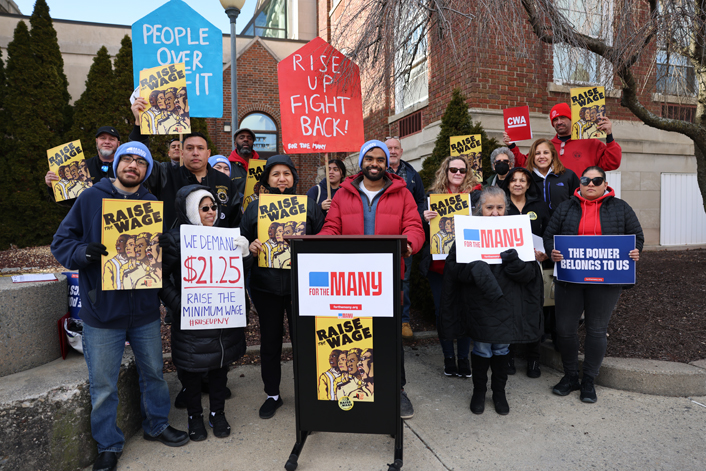
Small Business Owners, Local Unions, Workers, Rally Together
MIDDLETOWN – On Thursday, March 9th, the Raise Up NY Coalition and member For the Many rallied with Teamsters Joint Council 16, CWA Local 1120, minimum wage workers, and small business owners outside Middletown City Hall in support of the Raise the Wage Act (S1978A/A2204A), which would raise New York’s minimum wage to $21.25 by 2027 and index it to inflation. Speakers demanded that State Senator James Skoufis co-sponsor this critical piece of legislation. (After a press advisory was sent on Friday, Assemblymember Aileen Gunther relayed that she would co-sponsor the bill.)
The Raise the Wage Act is supported by 89% of Mid-Hudson Valley voters, more than any other region in the state. Statewide, that includes 89% of Democrats, 82% of Independents, and 65% of Republicans. Despite this, Skoufis is one of the last Hudson Valley Democrats not signed onto the legislation.
Upstate workers would stand to gain the most under this proposal; the upstate minimum wage only increased to $14.20 a few months ago. Raise the Wage would benefit 2.9 million New Yorkers, and put an average annual raise of $3,300 in their pockets, or an additional $63 per week. By comparison, Governor Hochul’s proposal—which would only index it to inflation—would increase wages by an average of barely $13 per week.
Cities like Seattle, San Francisco, Denver, and Washington, D.C. are already raising their minimum wages to around $20 in response to the sky-rocketing cost of living and states like Massachusetts and Vermont are proposing the same. Raising the minimum wage to at least $21.25 by 2027 is necessary to help address the worst cost-of-living crisis New Yorkers have experienced in 40 years, and will have similar impacts as the Fight for $15—which substantially increased earnings without resulting in any job loss.
Five independent studies have found that New York’s 2016 legislation, which raised the minimum wage to $15, led to historic reductions in poverty and earnings inequality in New York without hurting job growth. In fact, both upstate and down, jobs in New York grew at least as fast, and in many cases faster, than they did in similar counties in states that didn’t raise the minimum wage during that period. Raising the minimum wage also boosted sales at local businesses across New York and helped businesses keep their employees, saving them recruitment and retention costs.

